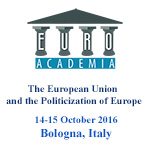Euroacademia Conferences
 Europe Inside-Out: Europe and Europeanness Exposed to Plural Observers (9th Edition) April 24 - 25, 2020
Europe Inside-Out: Europe and Europeanness Exposed to Plural Observers (9th Edition) April 24 - 25, 2020 Identities and Identifications: Politicized Uses of Collective Identities (9th Edition) June 12 - 13, 2020
Identities and Identifications: Politicized Uses of Collective Identities (9th Edition) June 12 - 13, 2020 8th Forum of Critical Studies: Asking Big Questions Again January 24 - 25, 2020
8th Forum of Critical Studies: Asking Big Questions Again January 24 - 25, 2020 Re-Inventing Eastern Europe (7th Edition) December 13 - 14, 2019
Re-Inventing Eastern Europe (7th Edition) December 13 - 14, 2019 The European Union and the Politicization of Europe (8th Edition) October 25 - 26, 2019
The European Union and the Politicization of Europe (8th Edition) October 25 - 26, 2019 Identities and Identifications: Politicized Uses of Collective Identities (8th Edition) June 28 - 29, 2019
Identities and Identifications: Politicized Uses of Collective Identities (8th Edition) June 28 - 29, 2019 The European Union and the Politicization of Europe (7th Edition) January 25 - 26, 2019
The European Union and the Politicization of Europe (7th Edition) January 25 - 26, 2019 7th Forum of Critical Studies: Asking Big Questions Again November 23 - 24, 2018
7th Forum of Critical Studies: Asking Big Questions Again November 23 - 24, 2018 Europe Inside-Out: Europe and Europeanness Exposed to Plural Observers (8th Edition) September 28 - 30, 2018
Europe Inside-Out: Europe and Europeanness Exposed to Plural Observers (8th Edition) September 28 - 30, 2018 Identities and Identifications: Politicized Uses of Collective Identities (7th Edition) June 14 - 15, 2018
Identities and Identifications: Politicized Uses of Collective Identities (7th Edition) June 14 - 15, 2018
The EU’s Changing Discourse in the EU Documents on Civil Society in Turkey
-
-

-
Presentation speakers
- Alper Yurttas, Istanbul University, Turkey
- Selma Sekercioglu, Nisantasi University, Turkey
- Download presentation
Abstract:
Since its beginning in the late 50’s, the relations between Turkey and the European Union always had ups and downs. After having candidacy status, this process has gained new dimensions and high politics such as refugee crises or foreign policy choices has become more important besides the technical aspects of integration. The European Commission (Commission hereafter) has published eighteen progress reports after 1998 with Turkey’s candidacy status. And also European Parliament (EP) published different resolutions with regard to these reports. In these reports and resolutions the EU’s wording has changed depending on the conditions of that period. It is a known fact that some of the civil society organizations can reach the EU bodies directly to affect decision-making process. Besides, they could be funded via the EU programmes like their counterparts in Europe. Considering democratic changes of Turkey, the position of civil society and their ability to self-expression, it is crucial to determine their situation. In this regard this study will focus on the EU’s changing discourse about the civil society in Turkey in the progress by analysing the Commission reports and the EP resolutions. By doing so, it has been aimed to show changes of the EU’s perception on Turkey’s accession process.
-
Related Presentations

The Borders of Europe
- Federico Cavalleri

The Brexit Vote: Conceptualizing European (Dis)Integration
- Antonio Sergio













